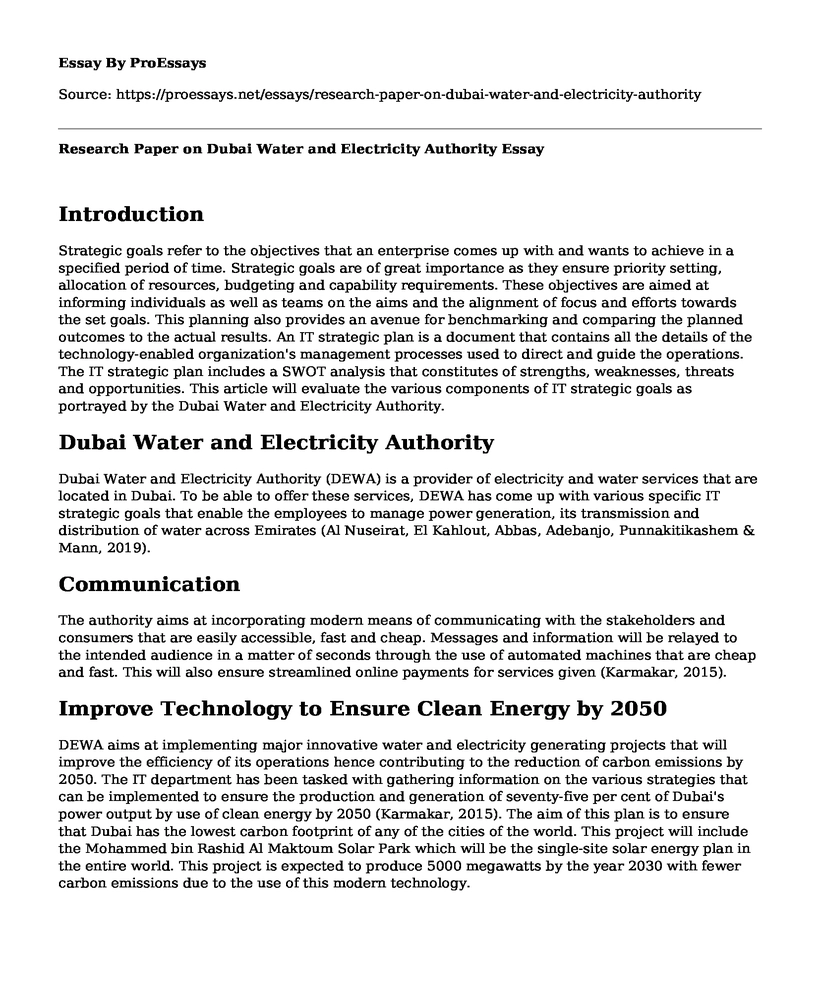Introduction
Strategic goals refer to the objectives that an enterprise comes up with and wants to achieve in a specified period of time. Strategic goals are of great importance as they ensure priority setting, allocation of resources, budgeting and capability requirements. These objectives are aimed at informing individuals as well as teams on the aims and the alignment of focus and efforts towards the set goals. This planning also provides an avenue for benchmarking and comparing the planned outcomes to the actual results. An IT strategic plan is a document that contains all the details of the technology-enabled organization's management processes used to direct and guide the operations. The IT strategic plan includes a SWOT analysis that constitutes of strengths, weaknesses, threats and opportunities. This article will evaluate the various components of IT strategic goals as portrayed by the Dubai Water and Electricity Authority.
Dubai Water and Electricity Authority
Dubai Water and Electricity Authority (DEWA) is a provider of electricity and water services that are located in Dubai. To be able to offer these services, DEWA has come up with various specific IT strategic goals that enable the employees to manage power generation, its transmission and distribution of water across Emirates (Al Nuseirat, El Kahlout, Abbas, Adebanjo, Punnakitikashem & Mann, 2019).
Communication
The authority aims at incorporating modern means of communicating with the stakeholders and consumers that are easily accessible, fast and cheap. Messages and information will be relayed to the intended audience in a matter of seconds through the use of automated machines that are cheap and fast. This will also ensure streamlined online payments for services given (Karmakar, 2015).
Improve Technology to Ensure Clean Energy by 2050
DEWA aims at implementing major innovative water and electricity generating projects that will improve the efficiency of its operations hence contributing to the reduction of carbon emissions by 2050. The IT department has been tasked with gathering information on the various strategies that can be implemented to ensure the production and generation of seventy-five per cent of Dubai's power output by use of clean energy by 2050 (Karmakar, 2015). The aim of this plan is to ensure that Dubai has the lowest carbon footprint of any of the cities of the world. This project will include the Mohammed bin Rashid Al Maktoum Solar Park which will be the single-site solar energy plan in the entire world. This project is expected to produce 5000 megawatts by the year 2030 with fewer carbon emissions due to the use of this modern technology.
Smart City Connected by Photovoltaic Solar Power to Buildings
Sheikh Mohamed has devices another IT strategic plan known as the Smart Dubai Initiative that will ensure that Dubai becomes the smartest city in the whole world. This IT directed initiative involves encouraging the owners of buildings to install the photovoltaic solar panels that will generate electricity (Singh, 2015). The electricity that will be produced by these solar panels will be used on the premises where they are installed and the excess exported to DEWA's grid. This IT strategic goal is aimed at encouraging the use of only renewable energy, increase the share of the energy mix, as well as diversify the sources of energy.
IT Powered Smart Applications and Meters Initiative
The smart applications and meters initiative to be fulfilled by the year 2020 will contribute to the fast-service connection, rationalization of energy use and fast response. The green charger initiative will establish infrastructure as well as elective vehicle charging stations is another IT directed the project that will boost water and electricity production and distribution by the Dubai water and electricity authority through ensuring mobility, sustainability and opportunity (Al Marzooqi, Packirisamy & Hussin, 2018).
Conclusion
IT strategic goals are among the most important plans of any organizations such as Dubai Water and Electricity Authority. This authority has put into place various IT plans that will ensure ease in production and distribution of electricity and water among the residents of Dubai. These IT strategies include; to utilize it powered smart applications and meters initiative, the smart city connected by photovoltaic solar power to buildings, improve technology to ensure clean energy by 2050 and modern mechanisms of communication and response.
References
Al Marzooqi, A., Packirisamy, N., & Hussin, M. (2018). Smart Cable Termination Rectification Program to Enhance Reliability of Dubai Electrical Infrastructure.
Al Nuseirat, A. A., El Kahlout, Z. M., Abbas, A., Adebanjo, D., Punnakitikashem, P., & Mann, R. (2019). An Analysis of A Structured Benchmarking Project: The Case of Dubai Electricity and Water Authority's Benchmarking Project. Benchmarking: An International Journal.
Karmakar, A. (2015). E-governance and its Role in Infrastructure Services of UAE, Case Study-Dubai. In E-Governance for Smart Cities (pp. 81-97). Springer, Singapore.
Singh, B. (2015). Smart City-Smart Life: Dubai Expo 2020. Middle East Journal of Business, 55(2473), 1-4. Retrieved from; https://platform.almanhal.com/GoogleScholar/Details/?ID=2-74070
Cite this page
Research Paper on Dubai Water and Electricity Authority. (2022, Dec 22). Retrieved from https://proessays.net/essays/research-paper-on-dubai-water-and-electricity-authority
If you are the original author of this essay and no longer wish to have it published on the ProEssays website, please click below to request its removal:
- Research Paper on Antifa Group
- Essay on Government (Public) Policies for Sport in Australia
- Nuclear Weapons Do Not Matter Essay Example
- Trump Scandal Intensifies: Whistleblower Complaint Alleges Abuse of Power - Essay Sample
- Essay on Exploring Imperialism, Sex, and Science: Author's Purpose in Book on U.S. Policy in Puerto Rico
- Essay on U.S. Incarceration: Rising Crime, War on Drugs, and Shifting Attitudes
- Obama Care: US Healthcare Reforms and Its Impact - Essay Sample







